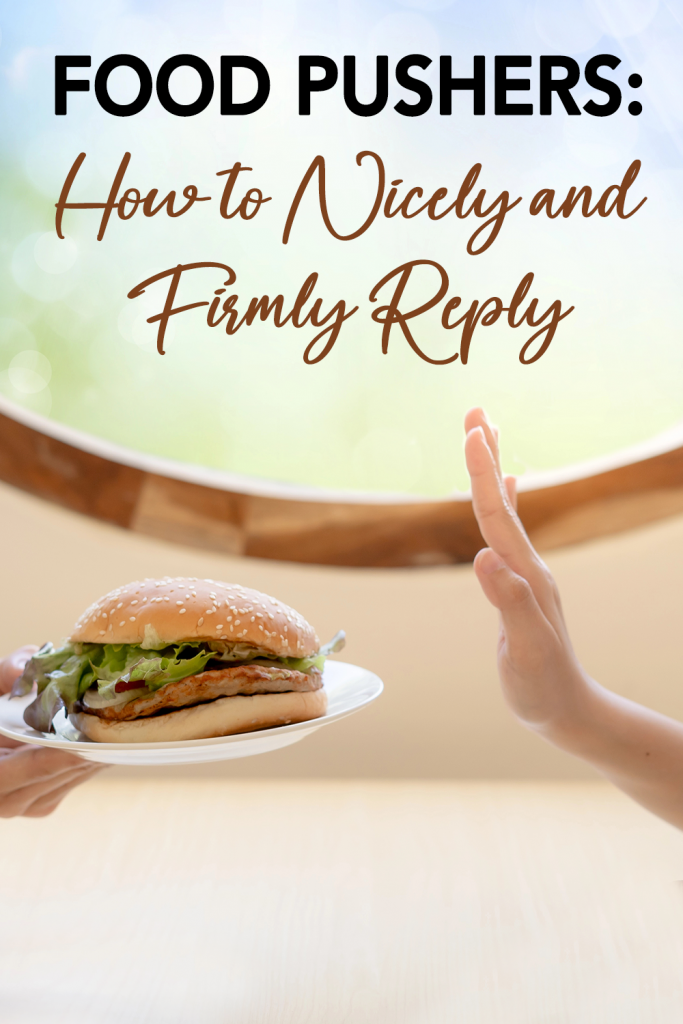
Food Pushers: How to Nicely and Firmly Reply
July 2, 2025When was the last time someone insisted you eat more? Maybe it was your mom, an in-law, a spouse, a coworker, or a friend. They push, encourage, and even insist you eat food that you don't want or need. And they ignore you when you try to say no. I call them food pushers. You're caught in the middle of trying to be polite and stand your ground.
I had the opportunity to interview bariatric dietitians Gayle Smith and Isabel Maples together with bariatric psychologist Dr. Connie Stapleton to dig deeper into why food pushers push. Dr. Connie stated that she loves the term ‘food pusher’ because it’s exactly what is going on: people are pushing, pushing food. More importantly, she said that if you’re being pushed, it’s 100% about the person doing the pushing, not about you. It’s uninvited and something to do with an issue the pusher has going on, and they’re trying to get you to participate in eating with them for some reason. Maybe it makes them feel better, Dr. Connie suggested, but the bottom line is that food pushers are pushing their issues on you.
A Food Pusher Will Push Their Issues On You
Gayle reminded us that you have to be in control of your mind, body, and spirit. ”I always invite a significant other, husband, wife, or friend to join in a session to hear what this patient is going through with surgery, such as a smaller stomach, throwing up, and dumping syndrome, and then they likely would be more careful about pushing food.”
Gayle and Isabel spend time in the clinic helping patients understand their fullness cues because they feel so different after surgery. Once you can finally identify fullness cues, it’s important to stop at the first sign of fullness. Isabel said that if someone's offering you an extra serving or a really indulgent dessert or snack food that is not going to make you feel your best, you're not going to be comfortable. And then emotions get really twisted with not being able to say no.
Food Pusher With Love
One type of food pusher, the one who's just trying to show love, how much they care for you, can also carry it too far. With this food pusher, Dr. Connie says it is important to look at this from the perspective of whether this person is doing what they're doing because they want or need something from you. It's likely validation or praise or acknowledgement. So you can give them what they want without eating the food. For example, she said “Gush. You know, gush over, what an amazing food spread or meal or food item. Lay it on thick and the person is probably going to forget that you're not even eating while sliding in that you'd prefer to take it home with you for later.”
Isabel shared that the first time she understood a food pusher from the love angle was when she was probably 25 and had a coworker who was working on making some healthy choices. She had done a great job with her changes, but she got sabotaged every time she went to her aunt's house. This is a really favorite aunt. All the holidays were at her house. She loved this aunt, and she could not say no. This aunt was always trying to give her an extra serving, give her something indulgent, or send her home with leftovers that my friend didn't want, but she couldn't say no. She finally got to the point where she didn't want to go see her aunt anymore. And that's when she realized she needed a different strategy to get her ‘no’ across.
Dr. Connie reminded us that not being able to say no is a you thing. And it's a difficult thing to learn to say no.
But what is the purpose of feeling guilty when you have an amazing agenda? You are improving your health. You’re trying to live longer and healthier. So the guilt thing is unnecessary, and yet it remains a very difficult thing to do. Learning to say no and learning to work through your own guilt issues is definitely a you thing and is a part of healthy adulting. Be firm. Be yourself. Be polite. And repeat because you believe it, because you have decided to go through with this surgery and you're going to be successful.
Thanks But No Thanks
Emphasize that you do appreciate their kindness, or not if it's something that's maybe not kindness to you. But you would like them to be your friend and accept your choice so you can stick to your weight loss goal because you want to be healthy again. It's critical that you learn to be able to do this. So if you don't know how, you've got to learn how, and you can do that with a coach, a therapist, or a mentor. I remember something Dr. Connie told me, and that is “hurt people hurt people.” And, that “hurt people, hurt themselves.” You must treat yourself the way a person who values themself does and set boundaries. You must believe in yourself. So boundaries and food pushers go hand in hand.
As Isabel suggested, “I would say I'm too full to take another bite. Or you could say, But that was such a great dish. May I have the recipe? How did you make it? Change the topic.” Gayle suggests the phrase “My dietitian says that's off limits for me at the moment.” She doesn’t mind taking the blame at all.
Practice saying no. Look in the mirror and practice it. Practice with a friend. Dig deeper with a therapist and learn a script. Practice it over and over and over. Then get therapy if needed and find out where that struggle comes from and work through the feelings you experience when you do say no, and it will get infinitely easier.
Bariatric dietitian Dr. Susan Mitchell is host of the podcast Bariatric Surgery Success.

 | ABOUT THE AUTHOR Bariatric dietitian Dr. Susan Mitchell is host of the podcast Bariatric Surgery Success. Selected as one of the Best 35 Dietitian Podcasts, Bariatric Surgery Success was chosen from thousands of podcasts on the web ranked by traffic, social media followers, domain authority, and freshness. With a focus on nutrition before and after bariatric surgery, I help you eat for success while you conquer cravings, emotional eating, and weight regain. Read more articles by Susan! |



